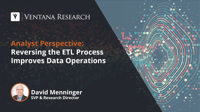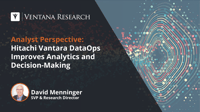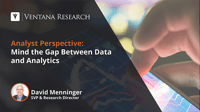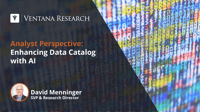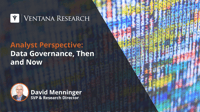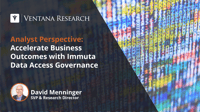At one point, analytics and business intelligence were considered non-mission critical activities. One of the primary concerns in designing analytics systems was to ensure they didn’t interfere with or draw computing resources away from operational systems. But today, analytical systems are integral to many aspects of operations. More than 9 in 10 participants in our Analytics and Data Benchmark Research reported analytics had improved activities and processes. However, most analytics and BI...
Read More
Topics:
Analytics,
Business Intelligence,
Data Management,
Data,
Digital Technology,
data operations,
Analytics & Data
Now more than ever, effective data management is crucial to enable decision-makers to better assess information and take calculated actions. It is also important to keep up with the latest trends and technologies to derive higher value from data and analytics and maintain a competitive edge in the market. However, every organization faces challenges with data management and analytics. And as organizations scale, the complexity only increases, creating a need for better data governance, data...
Read More
Topics:
Analytics,
Data Governance,
Data Management,
Data,
data operations,
analytic data platforms
If you’ve ever been to London, you are probably familiar with the announcements on the London Underground to “mind the gap” between the trains and the platform. I suggest we also need to mind the gap between data and analytics. These worlds are often disconnected in organizations and, as a result, it limits their effectiveness and agility.
Read More
Topics:
business intelligence,
embedded analytics,
Analytics,
Data Governance,
Data Management,
data operations,
Analytics & Data
Organizations are collecting data from multiple data sources and a variety of systems to enrich their analytics and business intelligence (BI). But collecting data is only half of the equation. As the data grows, it becomes challenging to find the right data at the right time. Many organizations can’t take full advantage of their data lakes because they don’t know what data actually exists. Also, there are more regulations and compliance requirements than ever before. It is critical for...
Read More
Topics:
Business Intelligence,
Data Governance,
Data Management,
Data,
data operations,
AI & Machine Learning
The analytics and business intelligence market landscape continues to grow as more organizations seek robust tools and capabilities to visualize and better understand data. BI systems are used to perform data analysis, identify market trends and opportunities and streamline business processes. They can collect and combine data from internal and external systems to present a holistic view.
Read More
Topics:
Analytics,
Business Intelligence,
Data Governance,
Data Management,
AI & Machine Learning,
Analytics & Data
We’ve recently published our latest Benchmark Research on Data Governance and it’s fair to say, “you’ve come a long way, baby.” Many of you reading this weren’t around when that phrase was introduced in 1968 to promote Virginia Slims cigarettes, but you may have heard the phrase because it went on to become a part of popular culture. We’ve learned a lot about cigarettes since then, and we’ve learned a lot about data governance, too.
Read More
Topics:
Big Data,
Data Governance,
Data Management,
Analytics & Data
Organizations are continuously increasing the use of analytics and business intelligence to turn data into meaningful and actionable insights. Our Analytics and Data Benchmark Research shows some of the benefits of using analytics: Improved efficiency in business processes, improved communication and gaining a competitive edge in the market top the list. With a unified BI system, organizations can have a comprehensive view of all organizational data to better manage processes and identify...
Read More
Topics:
business intelligence,
embedded analytics,
Data Governance,
Data Management,
natural language processing,
data operations,
Streaming Analytics,
AI & Machine Learning,
Streaming Data & Events,
operational data plaftforms
I’ve never been a fan of talking about semantic models because most of the workforce probably doesn’t understand what they are, or doesn’t recognize them by name. But the findings in our recent Analytics and Data Benchmark Research have changed my mind. The research shows how important a semantic model can be to the success of data and analytics processes. Organizations that have successfully implemented a semantic model are more than twice as likely to report satisfaction with analytics (77%)...
Read More
Topics:
Business Intelligence,
Data Management,
data operations,
AI & Machine Learning,
Analytics & Data,
semantic model
There is a fundamental flaw in information technology, or at least in the way it is most commonly delivered. Most technology systems are developed under the assumption that all people will use the system primarily in the same way. Sure, there are some options built in — perhaps the same action can be initiated by either clicking on a button, selecting a menu item or invoking a keyboard short-cut. The problem is that when every variation needs to be coded into the system, the prospect of...
Read More
Topics:
Business Intelligence,
Data Management,
natural language processing,
data operations,
AI & Machine Learning,
Analytics & Data
The data governance landscape is growing rapidly. Organizations handling vast amounts of data face multiple challenges as more regulations are added to govern sensitive information. Adoption of multi-cloud strategies increases governance concerns with new data sources that are accessed in real time. Our Data Governance Benchmark Research shows that organizations face multiple challenges when deploying data governance. Three-quarters (73%) of organizations report disparate data sources as the...
Read More
Topics:
Data Governance,
Data Management,
data operations
